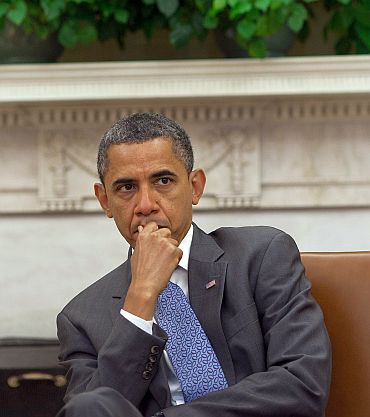 Pakistan's counter-terrorism measures have failed to yield results this year with insurgent activities gaining ground and operational situation facing the military there continuing to deteriorate, US President Barack Obama has informed the Congress.
Pakistan's counter-terrorism measures have failed to yield results this year with insurgent activities gaining ground and operational situation facing the military there continuing to deteriorate, US President Barack Obama has informed the Congress.
"The return of militant-inspired violence after a 4-month lull following the 2010 floods demonstrated how insurgent elements have managed to survive and even return to many areas previously cleared by the Pakistan military," a White House report sent by Obama to the Congress said.
In fact, the report informs the Congress that Pakistan has moved from "remaining static" to "decline" to "negative trends" in one of the key indicators and metrics of "Pakistan's efforts in counter-terrorism operations" as developed by the Obama administration at the direction of the Congress.
The 25-page unclassified section of the Af-Pak report was submitted by Obama to the Congress on Friday, which gives details of the progress made in Afghanistan and Pakistan in the war against terrorism from January to August this year.
A copy of the report was obtained by the Press Trust of India.
Informing the Congress on the progress on fourth metric -- 'Develop Pakistan's counter-insurgency (COIN) capabilities; continue to support Pakistan's efforts to defeat terrorist and insurgent groups', the White House report said indicators and metrics against this objective remained static during the reporting period of January 1 to March 31.
This objective declined during April 1 and June 30, while between July 1 and August 31 it was marked by continued negative trends.
"Years of progress in cross-border coordination and collaboration faced increased challenges, while the drawdown of US military elements in Pakistan continued the trend of a decreased US ability to contribute to Pakistan's COIN (counter-insurgency) and CT (counter-terrorism) efforts.
"Pakistan military operations continued in the FATA (Federally Administered Tribal Areas), but insurgent activity and high-profile strikes against security and government forces contributed to a decline in the security situation," the report said.
According to the White House report, despite efforts to develop more robust communication and coordination mechanisms to de-conflict cross-border incidents, the period saw an increase in incidents along the Afghanistan-Pakistan border as well as an overall decrease in coordination and collaboration.
"Insurgent activity along the Afghanistan-Pakistan border continues to pose a challenge to stabilisation efforts in both Afghanistan and Pakistan. Attacks occurred along the border of both the northern and southern FATA agencies, with a number of large-scale attacks resulting in high casualty rates for Pakistan's security forces in the north," it said.
"High-level ISAF (International Security Assistance Force), ANSF (Afghan National Security Forces) and Pakistan military engagement to de-escalate tensions along the border resulted in a decrease in shelling incidents in the south, but many of the core challenges remained unresolved along the entire FATA border, with continued potential for future escalation," the report said.
Between April 1 and June 30, the report said Pakistani military initiated two new COIN operations during this reporting period in Khyber and Kurram agencies of the FATA to disrupt militant movement from North Waziristan into the Tirah Valley of Orakzai and Khyber and to reduce attacks and intimidation against local tribesmen.
"These new offensive activities did not, in the end, alter the overall balance between militants and the Pakistan military. Additionally, insurgent attacks continued, with police and military personnel and facilities serving as the primary targets of domestic insurgents and terrorists," the report said.
"These attacks continued to undermine public confidence. COIN operations continued to face challenges given the static nature (of) Pakistani forces, the scope of militant activity, and considerable COIN capability shortfalls."
Finally, the White House said, due to continued shortcomings with build and transfer operations, durable and long-term stability in areas most susceptible to militant influence remained unfulfilled.
Early in the year, the return of militant-inspired violence after a 4-month lull following the 2010 floods demonstrated how insurgent elements have managed to survive and even return to many areas previously cleared by the Pakistan military, the report said.
Indeed, during this reporting period (January to March), the Pakistan military had to reclaim previously cleared areas in Mohmand and Bajaur agencies in the FATA, it said, adding that ongoing operations in Mohmand encountered more resistance than anticipated, hindered not only by the weather, but by improvised explosive devices (IEDs), efforts to return the displaced population and diminished COIN capabilities.
"A bright spot in the overall COIN effort remained the regeneration of the Swat valley, though the Pakistan Army continued to garrison two extra divisions in order to hold the valley against militant incursions," it said.
"One of the key challenges facing the Pakistan military was the ability of civilian institutions, including civilian security forces, to consolidate gains made in previous clearing efforts.
"The absence of effective and sustained 'hold, build and transfer' capacity, including reconstruction, development, governance, and law enforcement capabilities, continued to hinder efforts to render cleared areas resistant to militant return," the White House said.









 © 2025
© 2025